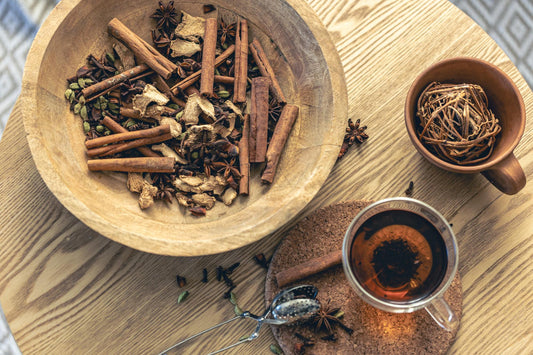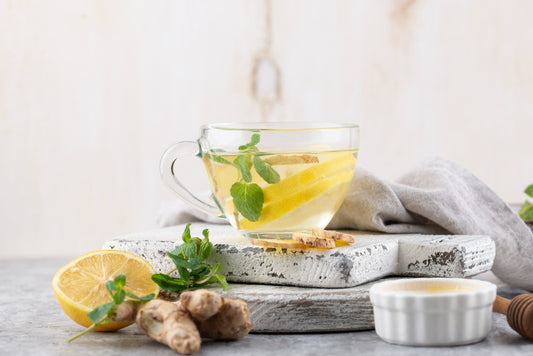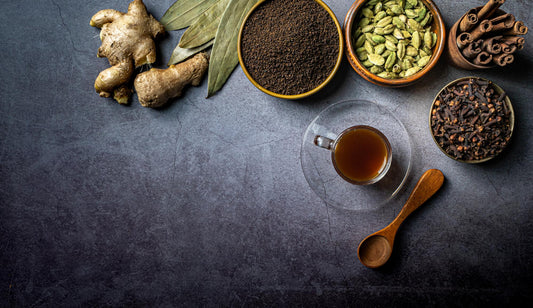Kashmiri Kahwa
Kashmiri Khawa tea, also known as Kashmiri tea or pink tea, is a traditional and aromatic beverage originating from the culturally rich region of Kashmir in northern India.
It is characterized by its unique blend of green tea leaves, aromatic spices, and a distinctive pink hue derived from the addition of a special ingredient- saffron.
Kashmiri Kahwa tea is celebrated not only for its delightful flavour profile and its cultural significance but also for its numerous health benefits, 5 of which are listed below.
Health Benefits
1. Antioxidant Properties
Khawa tea is rich in antioxidants, primarily derived from the green tea leaves used in its preparation. An antioxidant is a molecule stable enough to donate an electron to a rampaging free radical and neutralise it, thus reducing its capacity to damage.
These antioxidants delay, inhibit cellular damage, and help combat oxidative stress in the body, neutralising free radicals that can contribute to various chronic diseases and ageing.
The presence of these antioxidants may contribute to overall health and well-being by supporting cellular health.

2. Boosting Immunity
The combination of spices in Khawa tea, such as cardamom and cloves, brings not only a flavorful experience but also potential immune-boosting properties. These spices have been traditionally valued for their antimicrobial and anti-inflammatory effects.
Regular consumption of Khawa tea may contribute to a strengthened immune system, helping the body defend against common infections and illnesses-, helps control blood pressure, alleviate morning sickness, help lower your risk of developing heart disease, diabetes, and certain cancers. reduced ulcers, etc.

3. Improving Digestion
The aromatic spices found in Khawa tea, including ginger and cardamom, have been associated with digestive benefits. These spices may help alleviate indigestion, bloating, and discomfort.
Ginger, in particular, is known for its anti-nausea properties and its ability to promote healthy digestion. Enjoying Khawa tea after meals could be a soothing and digestive-friendly ritual.

4. Stress Relief and Relaxation
The warm and comforting nature of Khawa tea, combined with the calming effects of certain spices, can contribute to stress relief and relaxation.
For example, the presence of cardamom and cinnamon may have soothing properties, providing a sense of comfort and well-being. Saffron is believed to have mood-boosting properties. Several studies involving the use of saffron have shown its positive impact with treating depression in adults over 18- A good alternative for people who don’t tolerate antidepressant medications well.
The act of preparing and sipping on a cup of Khawa tea can also be a mindful practice, promoting relaxation in both body and mind.

5. Potential Weight Management Benefits
Green tea and black pepper, two key components of Khawa tea, have been studied for their potential role in weight management.
The catechins in green tea are thought to enhance metabolism and promote fat burning. The moderate caffeine content in green tea can also provide a mild energy boost, potentially supporting physical activity.
Black pepper, also known as the king of spices, aids in weight loss. While Khawa tea is not a magic solution for weight loss, incorporating it into a balanced diet and healthy lifestyle may complement overall weight management efforts.

Conclusion
It's important to note that while Khawa tea offers potential health benefits, individual responses can vary. Additionally, the overall impact on health depends on factors such as the specific ingredients used, preparation methods, and individual health conditions.
As with any dietary choices, moderation is key, and it's advisable to consult with a healthcare professional for personalized advice, especially for individuals with specific health concerns or conditions.
More on Kashmiri Kahwa:
Kashmiri Kahwa Tea- The Origin and The Cultural Richness



